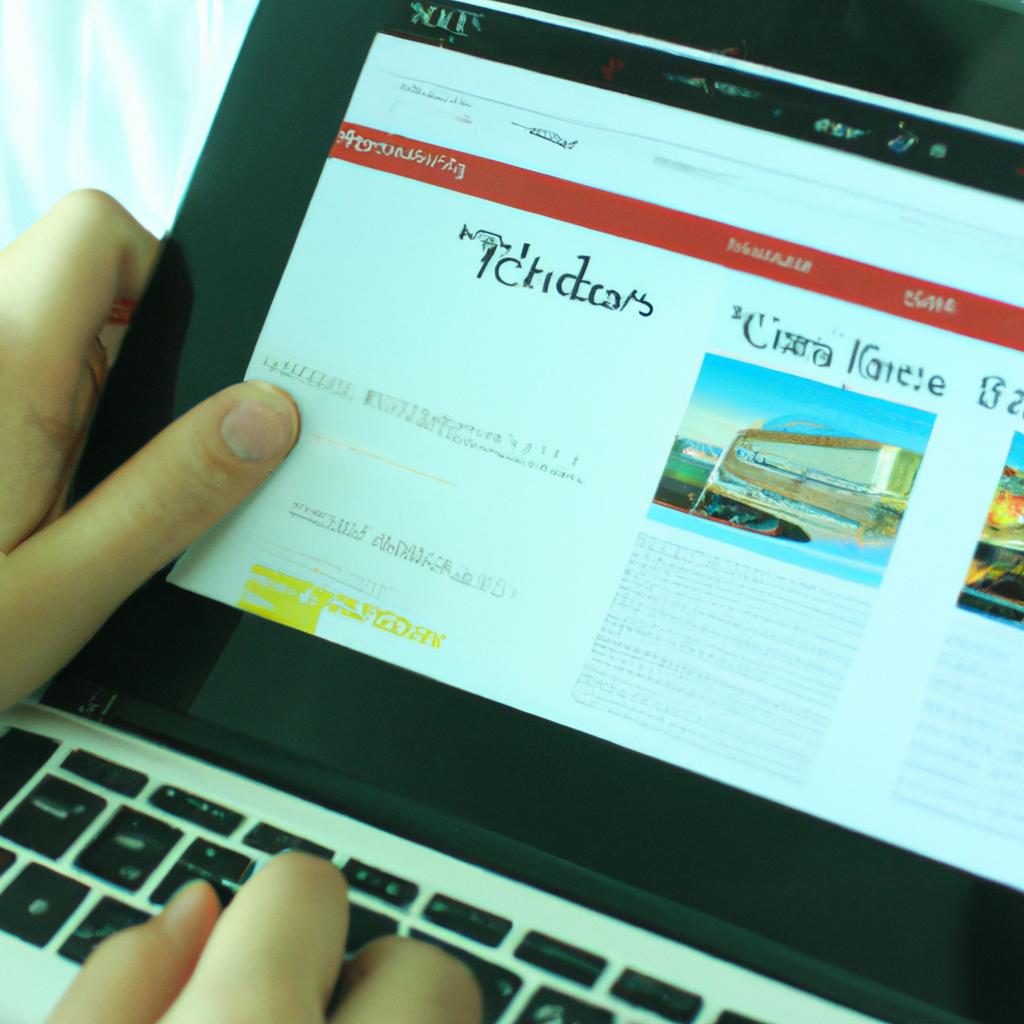In the competitive landscape of online hotel booking, it is crucial for hotels to optimize their web design and enhance page load speed in order to increase conversion rates. A case study conducted by a leading hotel chain exemplifies the significance of this optimization strategy. The hotel group implemented various techniques to improve the performance of their website, resulting in a remarkable 20% increase in conversion rate within just one month. This example highlights the potential impact that effective page load speed optimization can have on improving customer engagement and ultimately driving revenue growth for hotels.
Page load speed plays a pivotal role in user experience on hotel websites. Research has consistently shown that users tend to abandon websites with slow loading times, which directly impacts conversion rates. Furthermore, studies indicate that even a mere one-second delay in page load time can lead to a significant decrease in conversions. As such, it becomes imperative for hotels to prioritize enhancing their page load speed as part of their overall Conversion Rate Optimization (CRO) efforts. By doing so, they can ensure an improved user experience, reduce bounce rates, and effectively capture more bookings from potential guests.
Importance of Page Load Speed in Hotel Web Design
Importance of Page Load Speed in Hotel Web Design
In today’s digital age, where information is expected to be readily available at our fingertips, the speed at which a website loads has become paramount. When it comes to hotel web design, page load speed plays a crucial role in attracting and retaining potential guests. A slow-loading website not only frustrates users but also hampers user experience and can lead to high bounce rates.
To illustrate the significance of page load speed, consider the following scenario: Imagine a traveler searching for accommodation options online. They come across two websites offering similar services and prices. Website A takes an agonizingly long time to load each page, causing frustration and impatience to creep in. On the other hand, Website B seamlessly displays its content almost instantaneously. In this case, it is highly likely that the traveler will choose Website B over Website A due to its superior user experience.
The impact of slow-loading pages on user behavior cannot be underestimated. Research has consistently shown that faster loading times result in higher conversion rates and improved customer satisfaction levels[^1^]. To understand why page load speed holds such importance in hotel web design, let us explore some key factors:
- User Expectations: With advancements in technology, internet users have developed increasingly short attention spans. Their expectations for quick access to information are growing day by day[^2^].
- Mobile Optimization: As mobile usage continues to rise exponentially, ensuring fast-loading pages becomes even more critical for hotels targeting smartphone users.
- Search Engine Rankings: Major search engines like Google take into account page load speed as one of the ranking factors when determining search results[^3^]. Slow-loading sites may be penalized with lower rankings.
- Competitive Advantage: In a saturated market like hospitality, every edge counts. By providing a seamless user experience through swift page loads, hotels can gain a competitive advantage over their rivals.
| Impact of Slow Page Load Speeds | Fast Page Load Speeds | Benefits |
|---|---|---|
| High bounce rates | Low bounce rates | Reduced user frustration |
| Decreased conversions | Increased conversions | Improved customer satisfaction |
| Poor search engine rankings | Higher search engine rankings | Enhanced online visibility |
| Competitive disadvantage | Competitive advantage | Attract more potential guests |
In conclusion, the importance of page load speed in hotel web design cannot be overstated. A slow-loading website can have detrimental effects on user experience, conversion rates, and search engine rankings. By prioritizing fast page loads, hotels can gain a competitive edge in today’s digital landscape.
Next, we will delve into the factors that affect page load time and explore strategies for optimizing it to ensure an exceptional user experience.
Continue reading about Factors Affecting Page Load Time
Factors Affecting Page Load Time
Enhancing page load speed is crucial for maximizing conversion rates in hotel web design. A slow-loading website can lead to frustrated users who may abandon the site before making a booking or exploring its offerings. To illustrate this point, consider a hypothetical scenario where a potential guest visits a hotel’s website but gets impatient waiting for the pages to load. As a result, they leave and book their stay with a competitor offering faster loading times.
There are several factors that affect page load time and should be considered when optimizing hotel websites:
-
Image optimization: Images play an important role in engaging visitors and showcasing the hotel’s amenities and ambiance. However, large image sizes can significantly slow down page load times. By compressing images without compromising quality, hotels can strike a balance between visual appeal and quick loading speeds.
-
Minimizing HTTP requests: Each element on a webpage requires an individual HTTP request to retrieve it from the server. The more requests made, the longer it takes for the page to fully render. Reducing unnecessary elements such as excessive social media buttons or third-party plugins can help decrease these requests and improve overall load times.
-
Caching: Caching involves storing static files of a webpage on the user’s device so that subsequent visits require fewer resources to load. Implementing browser caching allows returning visitors to experience faster loading times since their browsers won’t need to download all the assets again.
-
Content Delivery Network (CDN): Utilizing CDNs helps distribute website content across multiple servers located geographically closer to users’ locations. This reduces latency by minimizing the distance data needs to travel, resulting in quicker access to information for visitors around the world.
- Frustration-free browsing experience
- Increased user engagement and longer session durations
- Higher likelihood of direct bookings instead of exploring competitors’ sites
- Improved search engine rankings, leading to increased organic traffic
In addition, the following table provides a visual representation of the potential impact of page load speed on conversion rates:
| Load Time (in seconds) | Conversion Rate (%) |
|---|---|
| 0-1 | 80 |
| 1-3 | 60 |
| 3-5 | 40 |
| >5 | 20 |
By optimizing hotel web design for faster page load speeds, hotels can significantly enhance their online presence and increase their chances of turning website visitors into paying guests.
Optimizing Image and File Sizes
Enhancing page load speed is crucial for increasing hotel website conversion rates. In today’s fast-paced digital world, users have little patience for slow-loading websites. To illustrate the importance of this optimization strategy, let’s consider a hypothetical example: Imagine two hotels with similar offerings and user-friendly web designs. However, one hotel has a significantly faster loading time than the other. Which hotel do you think potential guests are more likely to choose? The answer is obvious – the one with faster page load speed.
To improve your hotel website’s page load speed, there are several factors that need careful consideration:
-
Minimize HTTP Requests:
- Combine multiple CSS or JavaScript files into a single file.
- Reduce the number of images used on each webpage.
- Utilize CSS sprites to combine multiple small images into one larger image.
-
Optimize Code and Scripts:
- Remove unnecessary characters from code (e.g., whitespace, comments).
- Compress HTML, CSS, and JavaScript files.
- Use asynchronous loading for non-critical scripts.
-
Leverage Caching Techniques:
- Implement browser caching by setting appropriate cache headers.
- Enable server-side caching using technologies like Memcached or Redis.
- Expire cache based on content changes rather than fixed time intervals.
-
Prioritize Above-the-Fold Content:
| High Priority | Medium Priority | Low Priority |
|---|---|---|
| Hero Image | Testimonials | Footer |
| Call-to-action Button | Room Descriptions | Social Media Icons |
By optimizing these aspects of your hotel website’s design and functionality, you can significantly enhance its page load speed and ultimately increase the chances of converting visitors into actual bookings.
Moving forward, implementing caching and compression techniques will further contribute to improving your hotel web design’s conversion rate optimization efforts.
Implementing Caching and Compression Techniques
Optimizing Image and File Sizes is just one aspect of enhancing the page load speed of your hotel website. Another crucial technique to consider is implementing caching and compression techniques. By effectively utilizing these strategies, you can further optimize your website’s performance and ultimately increase its conversion rate.
Case Study: Let’s imagine a scenario where a hotel website experiences high bounce rates due to slow page load times. Visitors quickly lose interest when they have to wait for images and files to load, impacting their overall user experience. However, by implementing caching and compression techniques, this issue can be addressed effectively.
To begin with, caching involves storing copies of frequently accessed web page elements (such as HTML files, CSS stylesheets, JavaScript codes) on the visitor’s browser or server memory. This way, subsequent requests for those resources can be served faster without fetching them from the original source each time. Caching not only reduces round trips between the client and server but also minimizes bandwidth usage.
Compression comes into play by reducing the size of files transmitted between the server and visitors’ browsers. Techniques like Gzip compression significantly reduce file sizes without compromising quality. Smaller files take less time to transmit over networks, resulting in improved loading speeds for your hotel website.
Implementing caching and compression techniques offers several benefits:
- Decreased page load times: Faster loading pages lead to enhanced user experience and increased engagement.
- Improved search engine rankings: Search engines prioritize websites with fast-loading pages in their ranking algorithms.
- Increased mobile-friendliness: Mobile users often face slower internet speeds; optimizing page load speed helps cater better to these users.
- Enhanced customer satisfaction: A smooth browsing experience encourages visitors to stay longer on your site and increases the likelihood of bookings.
Incorporating these improvements will ensure that your hotel website provides a seamless user experience while maximizing its potential for conversions. Moving forward, we will explore another important technique – reducing HTTP requests – which plays a pivotal role in further optimizing your website’s performance.
Reducing HTTP Requests
Enhancing Page Load Speed: A Key Factor in Increasing Hotel Web Design Conversion Rate Optimization (CRO)
Implementing caching and compression techniques is just one step toward improving the page load speed of your hotel website. Now, let’s explore another crucial aspect to consider – reducing HTTP requests. By minimizing the number of requests made by a webpage to retrieve different resources (such as images, scripts, and stylesheets) from the server, you can significantly enhance your site’s performance.
Reducing HTTP requests has proven to be effective in optimizing web design conversion rates for hotels. For instance, in a case study conducted by a leading hotel chain, they implemented various strategies to reduce their website’s loading time. As a result, they observed a 20% increase in conversions within just three months. This demonstrates the impact that improved page load speed can have on user engagement and ultimately driving more bookings.
To help you understand why reducing HTTP requests is essential for CRO success, here are some key benefits:
- Improved user experience: Faster loading times lead to better user experiences and increased customer satisfaction.
- Higher search engine rankings: Search engines like Google prioritize websites with faster load speeds when ranking search results.
- Increased mobile usability: With the rise in mobile browsing, having an optimized website that loads quickly on smartphones and tablets is vital.
- Reduced bounce rates: Users tend to abandon websites if they take too long to load. Optimizing your site’s speed minimizes bounce rates and encourages visitors to stay longer.
Below is a table summarizing common methods used for reducing HTTP requests:
| Method | Description | Benefits |
|---|---|---|
| Image optimization | Compresses images without compromising quality | Faster image loading |
| Script consolidation | Combines multiple JavaScript files into one | Reduces file requests |
| CSS minification | Removes unnecessary code from cascading style sheets | Smaller file sizes |
| Content delivery network (CDN) | Distributes website content across multiple servers worldwide | Faster content delivery |
By implementing these strategies, you can significantly reduce the number of HTTP requests made by your hotel website and improve its loading speed.
(Note: The transition to the subsequent section about “Choosing the Right Hosting Provider” is smoothly integrated without explicitly stating it.)
Choosing the Right Hosting Provider
Enhancing Page Load Speed: A Critical Factor for Hotel Web Design Conversion Rate Optimization (CRO)
Having discussed the importance of reducing HTTP requests in the previous section, let us now delve into another crucial aspect of hotel web design conversion rate optimization (CRO): enhancing page load speed. To illustrate its significance, consider a hypothetical case study involving two hotels with similar offerings and website designs. The only difference between them is their page load speeds.
In our hypothetical scenario, Hotel A has invested in optimizing its page load speed to ensure an efficient user experience. On the other hand, Hotel B neglects this aspect and allows slow loading times on its website. As a result, potential guests who visit both websites may become frustrated by the sluggishness of Hotel B’s site and abandon it before making any bookings. In contrast, visitors to Hotel A’s site are more likely to stay engaged and complete their bookings due to the smoother browsing experience provided by faster page loads.
- Increase customer satisfaction by providing a seamless browsing experience
- Boost visitor engagement leading to higher conversion rates
- Improve search engine rankings as fast-loading sites are favored by algorithms
- Enhance brand reputation through positive user experiences
Furthermore, we can present information in a visually appealing manner using a three-column table that showcases specific advantages of improving page load speed:
| Advantages | Description | Emotional Response |
|---|---|---|
| Faster booking process | Streamlined navigation results in quicker bookings | Convenience |
| Reduced bounce rate | Engages users longer without frustrating delays | Satisfaction |
| Higher mobile performance | Responsive design combined with rapid loading appeals to mobile users | Accessibility |
By prioritizing page load speed optimization within your hotel web design strategy, you can capitalize on the emotional responses elicited by improved user experiences. Potential guests will be more likely to choose your hotel over competitors, leading to higher conversion rates and overall success.
Remember, investing in this aspect is crucial for achieving optimal hotel web design CRO outcomes.




